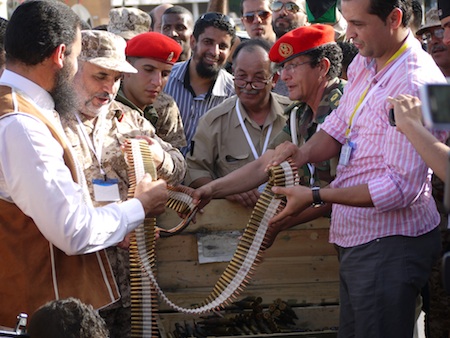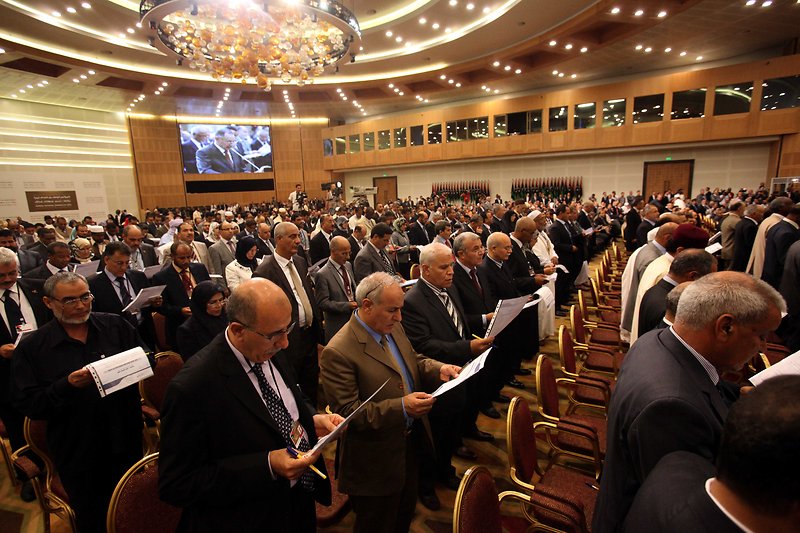By Chetan Pinto.

Tripoli, 5 October:
A large number of people have been voluntarily giving up arms at events organised by the national . . .[restrict]army at Benghazi and Tripoli. But considering the number of weapons circulating in Libya this event, although very welcome, seems to be a mere drop in the ocean. The more difficult challenge is to persuade people who do not believe in the revolution to give up arms. But although difficult, with the right balance of social pressure and recognition, it can be done.
People seem to have a lot of faith in the national army. A large number of people turned out to surrender arms at events organised by the army at Benghazi and Tripoli. A local TV channel motivated people by promising cars, television sets and ipads in prize draws.
Although it was a positive attempt, like most people, I too believe that those who gave up their weapons did so not because of any reward but because they sincerely believed it would ultimately lead to peace and stability in the country.
Unfortunately too many other people believe so. We should not forget that a lot of people in Libya do not still believe in the revolution and the idea of democracy and they would be the last people to surrender their arms. They have no faith in the current government or the army, and perhaps understandably so. They are very insecure about their future and their jobs and view everyone and everything that is happening in this country post-revolution with a great deal of suspicion. It is possible that not even money much less voluntary surrender will make them give up their weapons.
So how do we motivate them to give up arms?
In the 1970’s, British sociologists who studied the concept of voluntary blood donation believed that adding a monetary incentive didn’t lead to more of the desired behavior. It led to less. The reason: it tainted an altruistic act and crowded out the intrinsic desire to do something good. Doing good is what blood donation is all about. It provides what the American Red Cross brochures say is a ‘feeling that money can’t buy’. That’s why voluntary blood donations invariably increase during natural disasters and other calamities. But if governments were to pay people to help their neighbours during these crises, donations might decline.
Therefore in order to sustain this momentum of voluntary arms surrender, we need to re-create a ‘feeling that money can’t buy’ within Libya. Because, money will only increase the value of the weapons and people will hold on to them and sell to anyone who will pay the highest price.
Instead we need to appeal to the insecurities of the people in a positive way. There has to be a system whereby giving up arms, people are given some kind of social recognition and accepted as a part of new Libya.
One way of doing this is by honouring the volunteers by issuing certificates acknowledging their love and dedication towards the peace and stability of the nation without the expectation of any reward.
This could be coupled with an announcement of the list of people who have surrendered weapons on national television and on local radio. This would create a chain reaction when people find out from TV and radio that all their friends and especially enemies had given up their weapons and reassure the rest to consider doing so. Additionally people could also track how many people who volunteered to surrender their weapons are still hiding weapons at home and could issue a social boycott or report them to the police.
In order to achieve this voluntary surrender of arms there needs to be a grass roots movement on national scale led by college-going students and supervised by the national army. Groups of young men and women who meet up at colleges could form teams and go house to house reassuring people that the country is safe and encourage them to surrender any weapons they have. The actual surrender could happen at a specially organised events where every volunteer is cheered on and treated like a hero. The volunteers need to be made to believe that they have done a great service to the nation even though they had an opportunity to keep their weapons or sell it for money.
As the American President John F. Kennedy once said: “Ask not what your country can do for you, ask what you can do for your country”. So, don’t do it for the sake of your government or the ministers. They are here today. They will be gone tomorrow. Do it for your community, for your friends, for the thousands of people who paid their lives so that we could live in a free Libya.
Be it the liberals or the Islamists or revolutionaries or those who do no believe in the revolution, the truth of the matter is that almost everybody wants to live in peace. Nobody wants to live in fear of threats and violence. Therefore, if done right, voluntary arms surrender could turn a difficult challenge into an opportunity for uniting people.
Libyans made possible what many outsiders thought was a hopeless situation by uniting and rising up to the occasion to defeat a 42-year old regime. You did it once again to vote in Libya’s first free elections and ensured a smooth democratic transition. I believe we can all do it again to eliminate weapons from this country and secure our own future.
Chetan Pinto is an Indian living and teaching English in Libya for the past 6 years. You can check out his blog at www.chetanpinto.com or email him at [email protected]. [/restrict]







